Items
Mediator is exactly
Disability
-
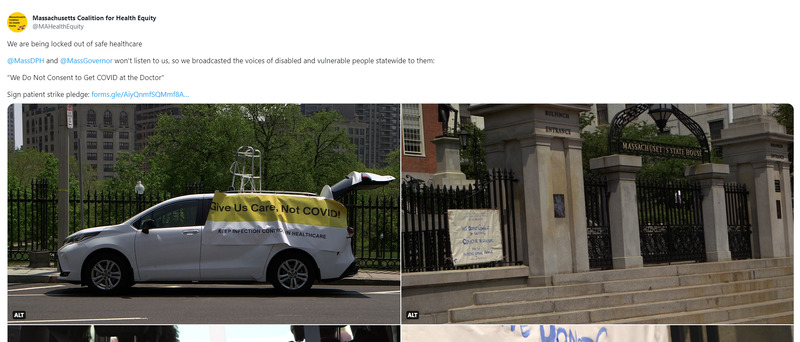 2023-05-14
2023-05-14Pandemics are Not "Great Equalizers" - Comparing COVID-19 to the Bubonic Plague Outbreak of 1870-1905
With the designation of COVID-19 as a "public health emergency" by the Centers for Disease Control and Prevention (CDC) ending as of May 11, 2023, public healthcare facilities throughout the US are rolling back protections they once employed to try to keep people safer during this ongoing pandemic. So, as this unit asks of us students, are pandemics the “great equalizers” in terms of social inequalities, and is there more equality now that the "emergency" has been deemed to be over? I argue that this is not the case, as immune compromised and disabled people have been more or less left for dead. A huge swath of healthcare facilities have removed mask mandates for care providers and hospital visitors, which leaves vulnerable and immune compromised people at a much higher risk of getting COVID-19 while receiving the medical care that is necessary for them to manage their conditions. In response, people and organizations, such as the Massachusetts Coalition for Health Equity in the tweet above, have begun to mobilize in favor of maintaining COVID-19 protections in healthcare settings by organizing strikes, protests, petitions, and phone banks to public officials. The reasons for maintaining COVID precuations such as mask mandates, access to COVID tests, and enhanced filtration in healthcare settings are clear. As the Massachusetts Coalition for Health Equity describes in their petition titled "Patient Strike Authorization Vote," the CDC "advises immunocompromised people to avoid crowded indoor settings, which now includes all healthcare institutions without universal masking," essentially maintaining that COVID is dangerous to immune compromised people while giving them no option but to risk exposure if they want to receive their necessary healthcare (Patient Strike Authorization Vote). The petition text explains that "[n]ational leaders in hospital epidemiology argue that universal masking should become the new standard of care, as gloves became with HIV" in order to keep people with compromised immune systems such as young children and elders safe (Patient Strike Authorization Vote). Currently, disabled and immune compromised people "are being locked out of safe healthcare" and are facing discrimination that makes them unwelcome and unsafe in healthcare settings (Massachusetts Coalition for Health Equity). In order to relate this modern COVID-19 pandemic to our course materials and demonstrate that discriminatory treatment during times of disease is not new, I will compare the above post to points from the text "The Chinese as Medical Scapegoats In San Francisco, 1870-1905" by Joan B. Trauner. This text discusses the discrimination against Chinese and other East Asian people living in San Francisco's Chinatown during a bubonic plague outbreak in the late nineteenth century. Sinophobic and anti-Asian sentiments, similar to those that arose during the epidemic Trauner details, have also been evident throughout the COVID-19 pandemic, so much so that even US President Donald Trump referred to COVID-19 as the "China virus." Ableism has also been prevalent throughout the COVID pandemic, as many people no longer care about the effects of the virus, because it harms disabled and immune compromised people most, especially people who also face racial discrimination in healthcare. Trauner explains that, because white people in the US believed the plague primarily affected Chinese and other Asian people, and because plagues were bad for business,"[t]he governor of California, Henry T. Gage, and executives of big business and of the large railroads, in conjunction with the San Francisco Board of Trade, the San Francisco Chamber of Commerce, and the Merchants Association, were all determined to prove that the plague did not exist in San Francisco" (78). The author of the Patient Strike Authorization Vote argues that today, we see a similar pro-business sentiment that comes at the expense of immune compromised people who are more likely to get sick with and die from COVID-19, writing: "Hospitals that remove masks and surveillance testing are making a value judgement about our lives, because they want to preserve their profit margins" (Patient Strike Authorization Vote). The CDC's ending of the COVID-19 public health emergency designation and the resulting halt of COVID mitigation procedures indicate that people are ignoring the needs of immune compromised people so that everyone can feel more comfortable going "back to normal" and maintaining consumption habits that are desired by businesses. Additionally, in both the past plague outbreak and the current pandemic, public health officials have shown hesitancy to give people vital information, which has led to harm. As Trauner explains, during the bubonic plague epidemic, "San Francisco Mayor Eugene Schmitz refused to approve the printing of health reports and vital statistics and even attempted to remove from office four members of the Board of Health who persisted in stating that plague existed in San Francisco" (79). Today, because the public health emergency designation ended on May 11th, 2023, the CDC is "no longer reporting aggregate cases and deaths, COVID-19 Community Levels, COVID-19 Community Transmission Levels, or COVID-19 Electronic Laboratory Reporting (CELR) data," all of which have been used to determine the severity of the situation throughout the pandemic (COVID Data Tracker). Meanwhile, over one thousand people are dying of COVID every single week, but COVID transmission levels are not being tracked, so people cannot know how many COVID positive cases there are in their county and how likely they are to contract the virus by going out in public (COVID Data Tracker). Another similarity between the COVID-19 pandemic and the bubonic plague outbreak of the late nineteenth century lies in the responses of the people facing discriminatory treatment in public health settings during these respective disease outbreaks. Trauner writes that before, during, and after the bubonic plague outbreak, Chinese businesses and health practitioners constructed and operated their own hospitals that would treat the people of Chinatown, because they were not welcome at other hospitals due to racial discrimination (81). Trauner explains that "[e]arly Chinese immigrants realized the necessity of banding together and providing for their own health care needs," in light of the government abandoning their health needs (81). Activists and organizations like the Massachusetts Coalition for Health Equity are currently banding together and fighting to get better and safer care for immune compromised people during the COVID-19 outbreak, as they are also facing discrimination at hospitals rolling back COVID precautions, because these spaces are not safe for them. The organizing they are doing to try to make healthcare settings safer for immune compromised people looks different, as no one is proposing the creation of immunocompromised-specific hospitals. They are fighting for better treatment, still, using slogans like "We Do Not Consent to Get COVID at the Doctor," and urging people that "[w]e must take collective action to prevent this mass violation of our human rights and federal rights to safe care," as stipulated under the Americans with Disabilities Act (Massachusetts Coalition for Health Equity). In both disease outbreaks, it has been the duty of those being discriminated against to take care of and advocate for themselves. So, in fact, pandemics are not "great equalizers"; in reality, they not only make pre-existing inequities even more visible, but exacerbate them even further. As Trauner argues, "Health policy [...] manifests not only the state of the medical sciences, but the expectations and the value system of society-at-large," and as such, if society-at-large is racist and ableist, then the health policies put into place will reflect these discriminatory values (70). These governmental measures come at a cost to everyone, and especially those facing racist and ableist discrimination. Had the nineteenth-century bubonic plague outbreak been determined an emergency and treated as a serious threat in spite of sinophobic and anti-Asian sentiments, perhaps more research could have been carried out sooner, and more lives could have been saved. If people in the US continue to take the COVID-19 pandemic seriously and not dismiss the pleas of immune compromised and disabled people to continue precautions, perhaps loss of life and further disablement from COVID infection can be mitigated. -
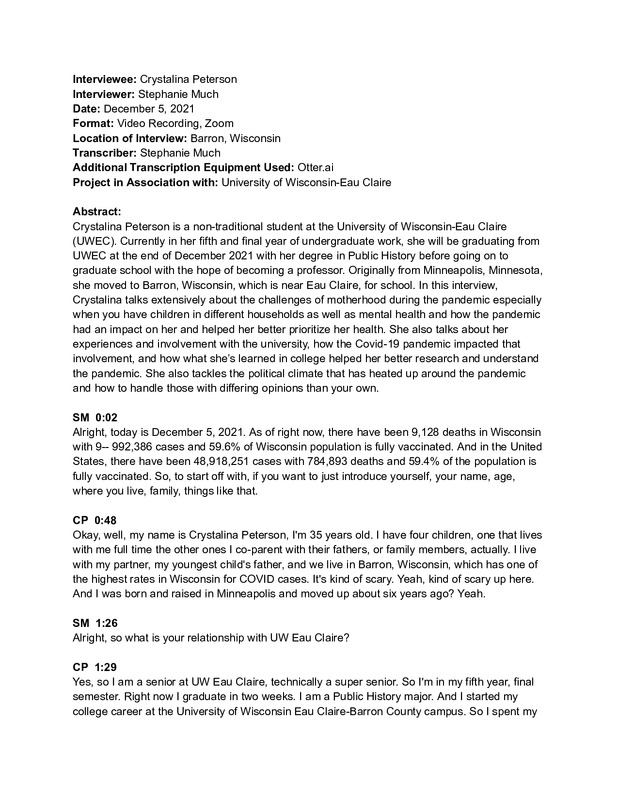 12/05/2021
12/05/2021Crystalina Peterson Oral History, 2021/12/05
Crystalina Peterson is a non-traditional University of Wisconsin-Eau Claire (UWEC) student. Currently, in her fifth and final year of undergraduate work, she will graduate from UWEC at the end of December 2021 with her degree in Public History before going on to graduate school with the hope of becoming a professor. Originally from Minneapolis, Minnesota, she moved to Barron, Wisconsin, near Eau Claire, for school. In this interview, Crystalina talks extensively about the challenges of motherhood during the pandemic especially when you have children in different households as well as mental health and how the pandemic had an impact on her and helped her better prioritize her health. She also talks about her experiences and involvement with the university, how the Covid-19 pandemic impacted that involvement, and how what she’s learned in college helped her better research and understand the pandemic. She also tackles the political climate that has heated up around the pandemic and how to handle those with differing opinions than your own. -
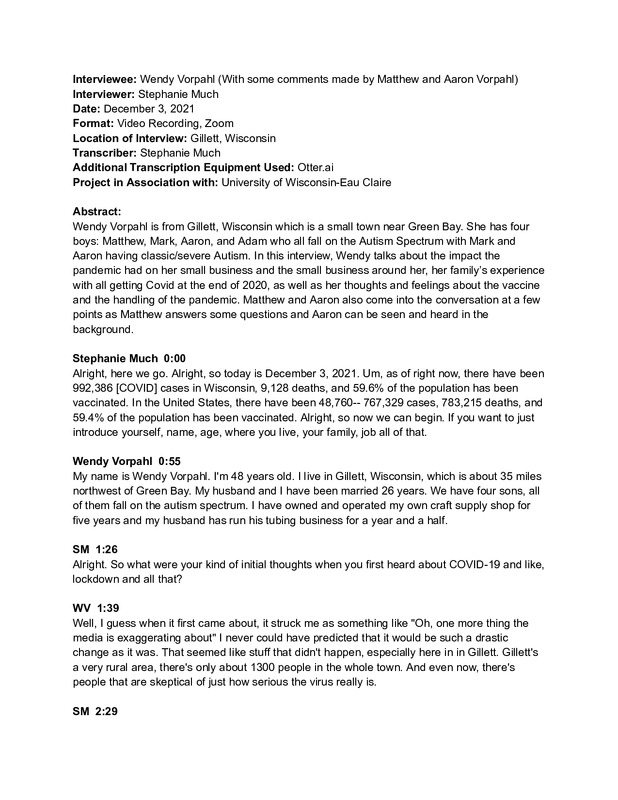 12/03/2021
12/03/2021Wendy Vorpahl Oral History, 2021/12/03
Wendy Vorpahl is from Gillett, Wisconsin which is a small town near Green Bay. She has four boys: Matthew, Mark, Aaron, and Adam who all fall on the Autism Spectrum with Mark and Aaron having classic/severe Autism. In this interview, Wendy talks about the impact the pandemic had on her small business and the small business around her, her family’s experience with all getting Covid at the end of 2020, as well as her thoughts and feelings about the vaccine and the handling of the pandemic. Matthew and Aaron also come into the conversation at a few points as Matthew answers some questions and Aaron can be seen and heard in the background. -
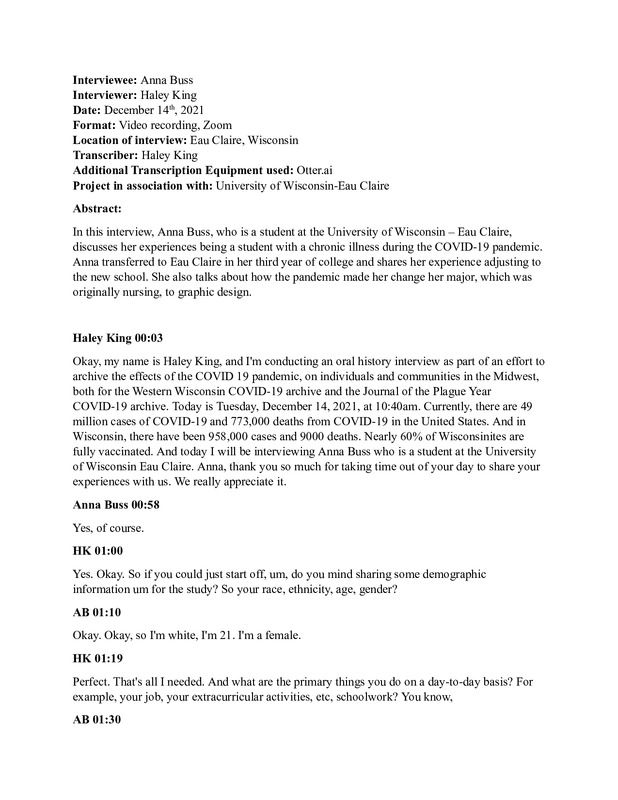 12/14/2021
12/14/2021Anna Buss Oral History, 12/14/2023
In this interview, Anna Buss, who is a student at the University of Wisconsin – Eau Claire, discusses her experiences being a student with a chronic illness during the COVID-19 pandemic. Anna transferred to Eau Claire in her third year of college and shares her experience adjusting to the new school. She also talks about how the pandemic made her change her major, which was originally nursing, to graphic design. -
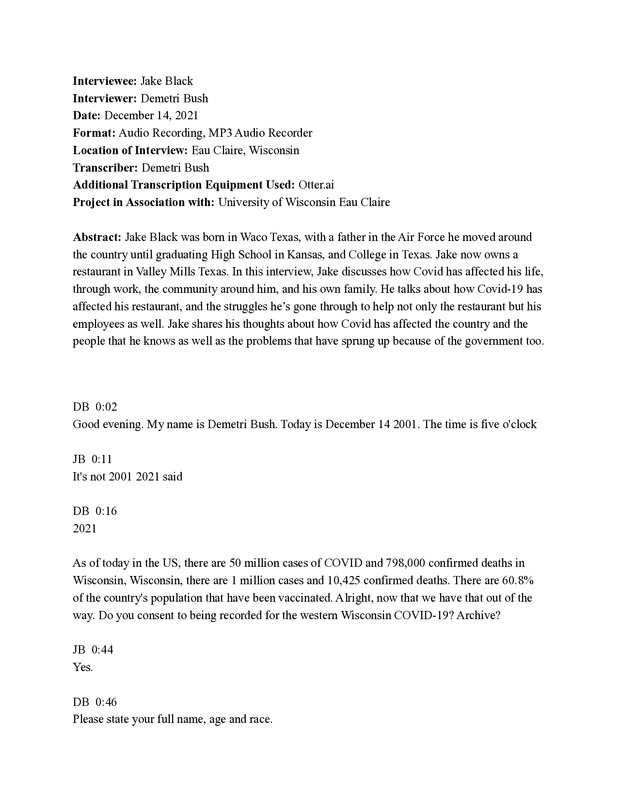 12/14/2021
12/14/2021Jake Black Oral History, 2021/12/14
Jake Black was born in Waco Texas, with a father in the Air Force he moved around the country until graduating High School in Kansas, and College in Texas. Jake now owns a restaurant in Valley Mills, Texas. In this interview, Jake discusses how Covid has affected his life, through work, the community around him, and his own family. He talks about how Covid-19 has affected his restaurant and the struggles he’s gone through to help not only the restaurant but his employees as well. Jake shares his thoughts about how Covid has affected the country and the people that he knows as well as the problems that have sprung up because of the government too. -
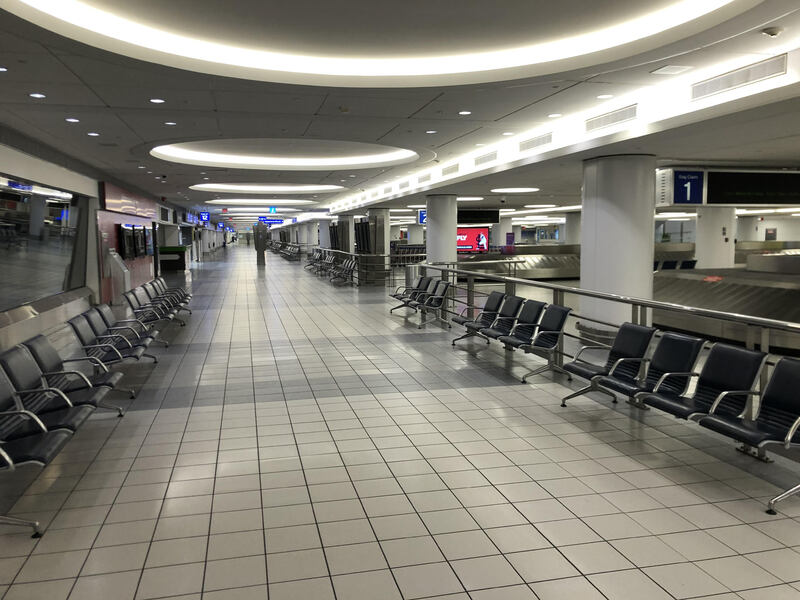 2020-05-23T09
2020-05-23T09Sampling a dystopian world
We lived in a very town in western Illinois as the pandemic arrived in America. Covid-19 seemed abstract until circumstances caused us to travel to a major international airport. The eerie quiet, in place of what should have been a noisy, madcap atmosphere, elevated sounds I normally would not have heard. It was as if a scene from a science fiction film had jumped off the screen and into my life. The experience had a nightmarish quality that has stayed with me two years later. -
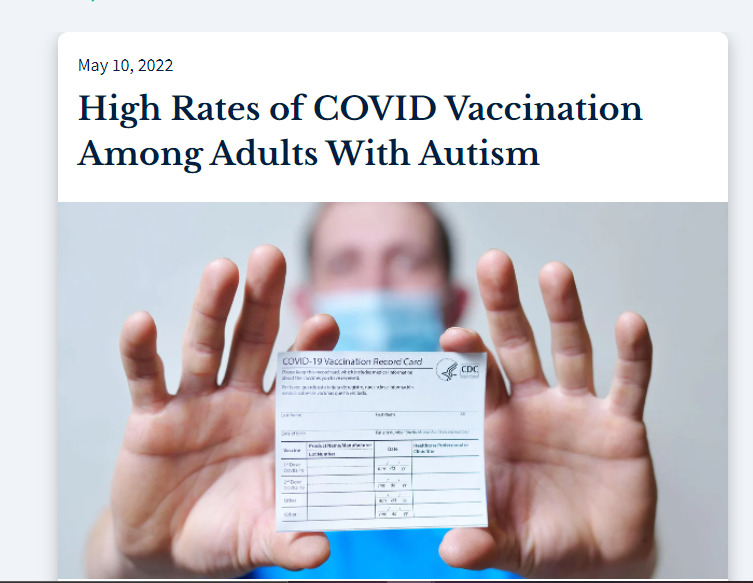 2022-05-10
2022-05-10High Rates of COVID Vaccination Among Adults With Autism
This is a news story from Health Day. Adults with autism have been shown to have higher rates of vaccination according to a new study. Those with autism are more at-risk for severe illness if they contract the disease, say researchers. To get the data, researchers sent online surveys to 431 autistic adults in Pennsylvania. They showed that about 78% of survey respondents said they had received or intended to get a COVID-19 vaccine, and more than 55% said that they had received at least one dose. In comparison, 42% of the overall adult population in Pennsylvania had received at least one dose of a COVID-19 vaccine as of the median response date for the survey (April 2, 2021), according to the study. The findings were published in the journal Vaccine. -
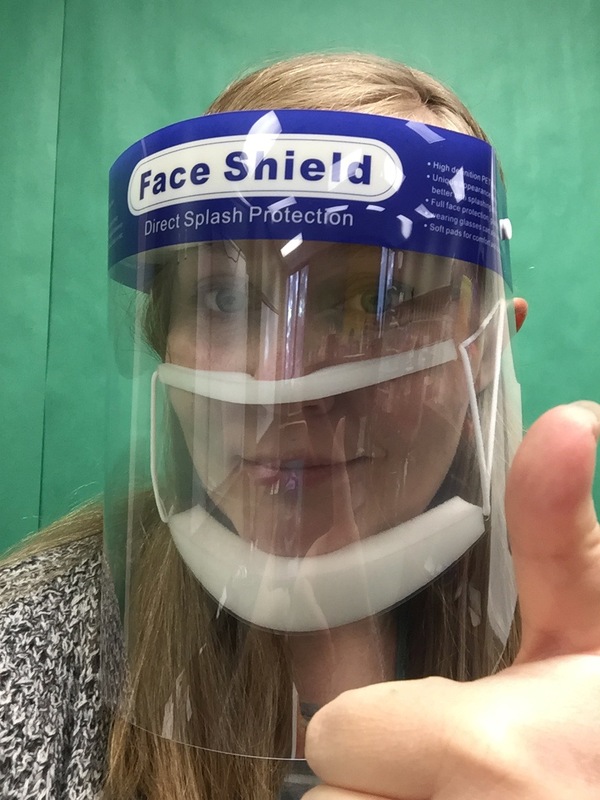 2020-03-15
2020-03-15Together and Apart
Flagstaff AZ. My husband was an occupational therapist who regularly worked in the ICU at Flagstaff Medical Center. I remember the week after the lockdown started (March 15th or so) the Covid-19 numbers were doubling every week at FMC. My husband started changing out of his scrubs and shoes in the garage. I was a speech therapist with the school district and we were all asked to stay home, which was good because I have two school-aged children. As the Covid numbers started to skyrocket in our region due to a devastating outbreak on the Navajo nation, my husband became more and more worried about bringing the virus home since there was a shortage of PPE. When it was announced that my own job would go remote and I would need to start scheduling teletherapy sessions with my students, we decided it would be better for me and the kids to go live with my mom and dad in Tempe for a few weeks. My mom is a retired teacher and offered to teach my kids while I worked with my students online. The kids loved having grandma be their teacher. I had to learn how to work with preschoolers with disabilities over Zoom, which is no easy task! Meanwhile, my husband was providing us updates; when he finally got fitted for a tyvek suit was a happy day because he could spend all day in it helping patients. The doctors were trying new therapies with patients every week, but mostly he saw many people seem to get better and then take unexpected deadly turns. Treating isolated, scared patients while feeling helpless to know what to do was taking a toll on everyone at the hospital. The kids and I spent 7 weeks with my mom, face-timing him every night. Finally, as the school-year came to a close, we were able to reunite. I captured the moment we got home and my husband hugged my 5 year old son. We were so lucky; no one in the family had gotten sick so far despite my husband being in close proximity to patients each day. Over the summer and into the next school year we were hoping for some normalcy to return but it was nothing but adapting to change. The kids made friends with the neighbors down the street not by playing in the front yard, but by yelling greetings over the fence. When they started school in the fall we organized a "pod" with other families whose children were in the same classes as ours at DeMiguel elementary. We had four kindergarteners and three 2nd graders all doing school over Zoom at the same time, which was not easy for the parents who had to oversee them (my husband had the honor at least once a week), but the kids really benefitted from having friends to play with during breaks. We saw them become more motivated to participate and happier overall. I started seeing some students in-person for the first time at the school on a very limited basis. I wore clear PPE products so my students could see my mouth. The kids didn't go back to in-person school until about a year after the lockdown (Spring 2021). As the school year ended, the wildest school year of our lives, things did start to seem normal again, but we ended up leaving Flagstaff for Tucson due to soaring high home prices and my husband needing a fresh start away from the memories of the early pandemic. -
2022-04-29
Dementia and Covid
Over the last two years, being away from people, and having to social distance, I have still taken care of my grandfather. He has Dementia. Now that things are starting to get a little better, and a lot of people have been vaccinated, I have been able to have him come stay the night at my house every Friday. The first couple of times he was confused, but now he seems to instinctively know the routine of it all. He likes getting to spend time with my stepdad and my girlfriend, and walk outside to see the horses. Covid has taken a lot, besides the countless lives. It rapidly increased my grandpa’s progression in memory loss. Most days he can’t quite remember my name or my mom's name. But at least he is happy, he laughs and smiles, and knows that he loves and trusts us. Him not being able to have as much social interaction as he used to has drastically changed his cognitive abilities. Today is a Friday. He was pretty quiet on the drive from his house to mine. I got him an ice cream cone. No matter where he is cognitively that man will always, always want an ice cream cone. Vanilla to be specific. We used to get ice cream cones from McDonald's when I was little when he would pick me up to spend the night at his house. I wonder how many ice cream cones we have left. I hate that his memory has been cut short and stripped from him. He had been slowly declining for the last few years before Covid, but once we hit the lockdowns, it was all over. He was good at hiding it for the first 6 months or so, but in the last year and a half it has been very clear. I miss who he was, I know we all do. -
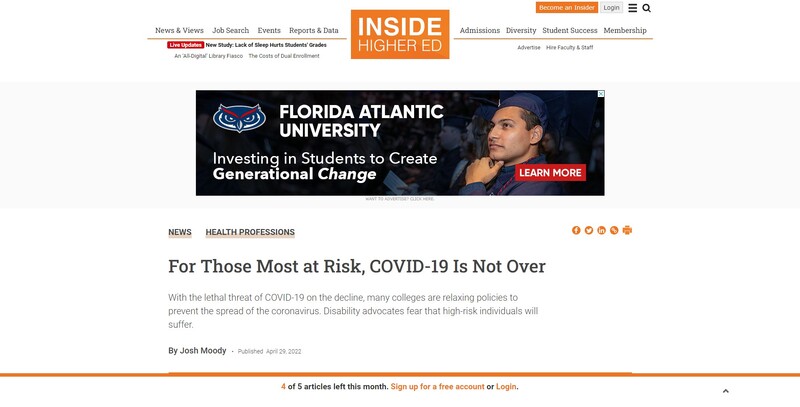 2022-04-29
2022-04-29For Those Most at Risk, COVID-19 Is Not Over
This is a news story from Inside Higher ED by Josh Moody. As schools begin to resume to pre-COVID standards, not all are happy with this change. Those with disabilities worry about the loosening guidelines and how it would affect their health. COVID rates vary across the country, but many colleges are starting to drop protocols. Some disability advocates claim that this is a wrong decision from the colleges doing this, as it is putting people at high risk in more danger. COVID Safe Campus, a group of high-risk academics and activists with disabilities, recently launched a report card grading college coronavirus policies. The effort, they say, grew out of concerns that high-risk individuals are being left behind as colleges return to pre-pandemic normalcy. Colleges are graded on masking, COVID-19 testing and vaccination policies, and access to remote learning. Of the 90 institutions graded from this organization, majority have received a D or an F, and none earned an A. -
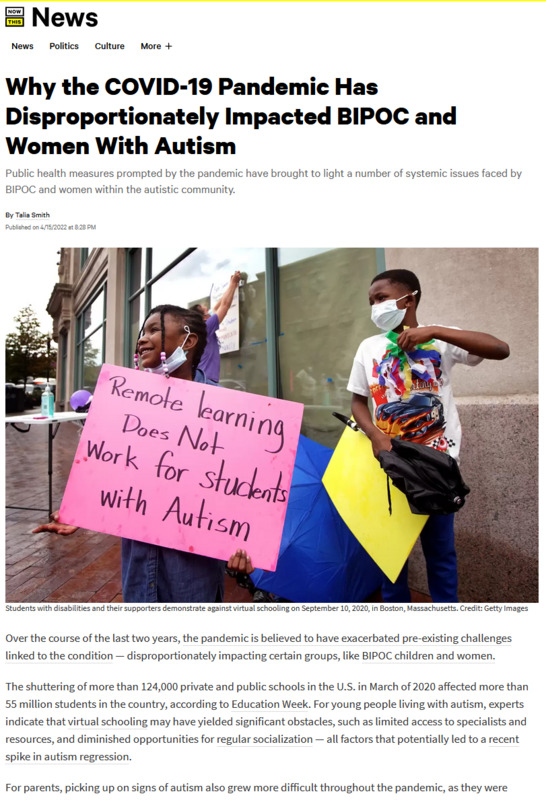 2022-04-15
2022-04-15Why the COVID-19 Pandemic Has Disproportionately Impacted BIPOC and Women With Autism
This is a news story from Now This News by Talia Smith. The author says that over the course of the pandemic, BIPOC and autistic women have been disproportionately affected. BIPOC parents who were not able to work remotely struggled to support their autistic children. One study led by the NIH analyzing the impact of the pandemic on BIPOC and low-income populations shows that families with a child living with autism witnessed an increase in sleep issues and behavioral problems, in addition to increased conflict between children and adults and the use of more severe disciplinary methods. In a study published in “Molecular Autism,” researchers revealed that for adults with autism, the pandemic brought relief from certain stressors like “sensory overload” and ultimately led to an “increase in solidarity.” -
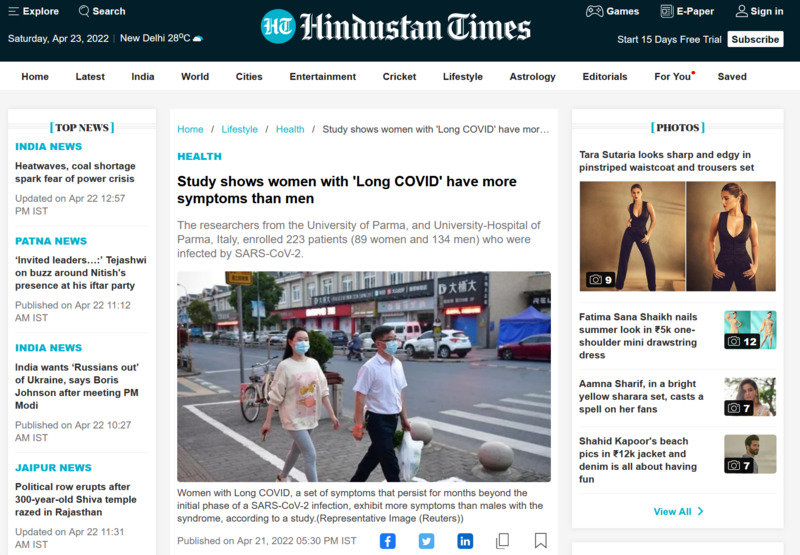 2022-04-21
2022-04-21Study shows women with 'Long COVID' have more symptoms than men
This is a news story from the Hindustan Times. There has been a study showing that women tend to be affected more by 'Long COVID' symptoms than men do. The research was published in the Journal of Women's Health. In the study, women are more likely to have fatigue, difficulty swallowing, and chest pain after a COVID infection compared to men. -
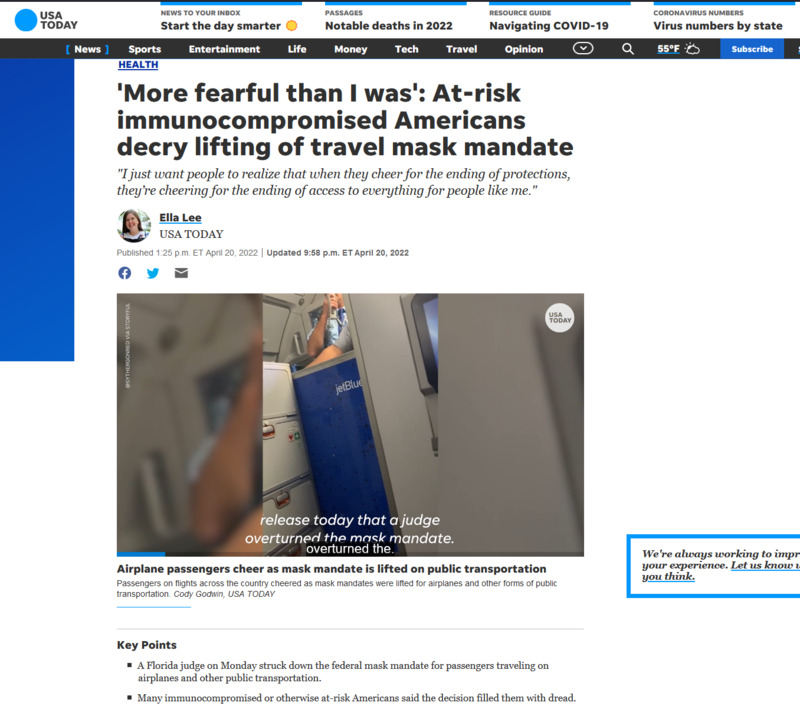 2022-04-20
2022-04-20'More fearful than I was': At-risk immunocompromised Americans decry lifting of travel mask mandate
This is a news story from USA Today by Ella Lee. This is about pushback against the lifting of the mask mandate, as it has made immunocompromised people afraid. "Being immunocompromised, it's already a huge risk getting on a plane with everybody masked," said Derek Schmitz, 17, of Oxford, Alabama, who takes immune-suppressing arthritis medication and has to fly for work as a disability advocate. "Now, knowing that I most likely will be one of the only people on a plane with a mask is petrifying." After the lift of the mandate for planes and other public transportation was voided, ride share companies like Uber and Lyft have followed suit in removing their own mandates. "I was angry and felt hopeless," said Erin Masengale, 33, who has multiple autoimmune diseases treated by immunosuppressants. "I just want people to realize that when they cheer for the ending of protections, they’re cheering for the ending of access to everything for people like me." Under the strict definition of immunocompromised, only about 3% of Americans fit that definition. Though, the author mentions that disabled and chronically ill people, a much larger population, also face risk with the lifted mandates. The question I have for people that read this is: is it worth it to keep the mandate even though it caters to a relatively small population? Would it be wiser for people already with these ailments to mask on their own instead of mandating it for everyone else, especially if overall cases and hospitalizations are lower? These are the questions I have after reading this article. I am not against people masking when they see fit, but it is clear that these mandates have worn many people out. -
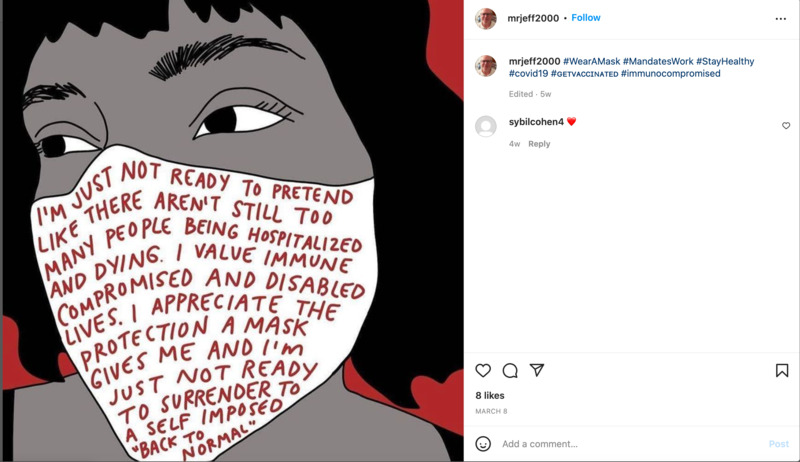 2022-03-08
2022-03-08I am not ready to give up my mask
This is an Instagram post by mrjeff2000. This post shows a picture with words on the mask for reasons to keep wearing one. Some of the reasons include: too many still being hospitalized; and the protection of the immunocompromised and disabled. -
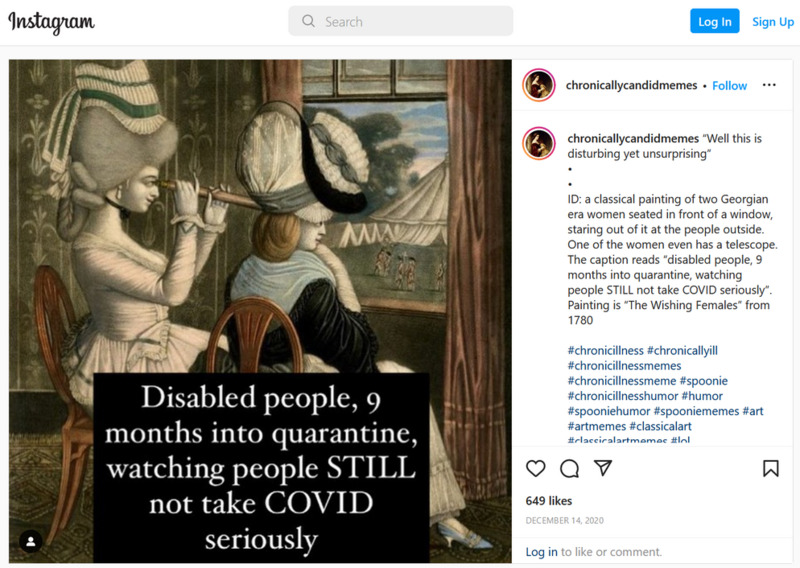 2022-04-09
2022-04-09Coping with humor
Sometimes coping through humor is what gets us through. -
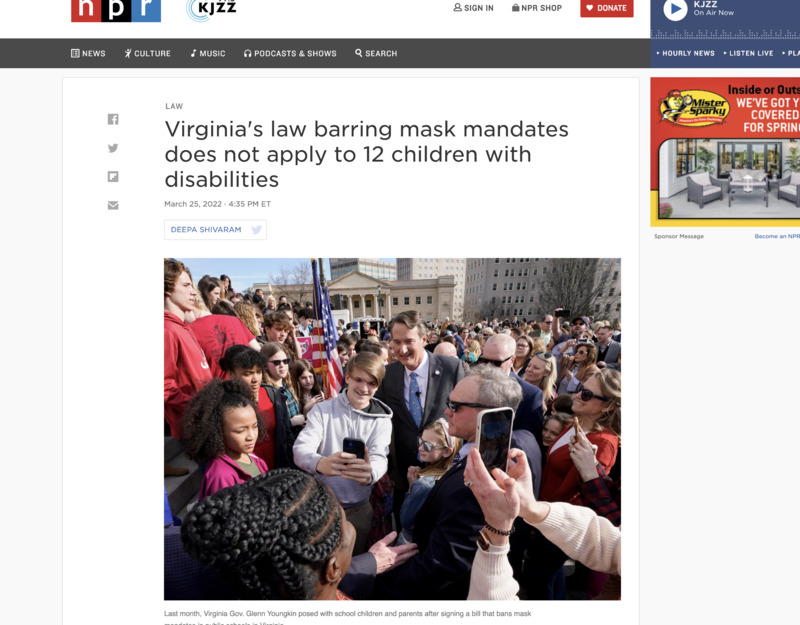 2022-03-25
2022-03-25Virginia's Law Barring Mask Mandates Does Not Apply to 12 Children with Disabilities
A news article from NPR talks about the parents of 12 children that challenged the newly signed law by Governor Glenn Youngkin to halt the enforcement of that law because it violated the children's rights under the federal American with Disabilities Act. This law would only give parents the right to choose for their own children. The group of parents have kids with health conditions that range from asthma to cystic fibrosis, which put them at heightened risk for COVID-19. What about other kids that have health conditions that make them a heightened risk for COVID whose parents didn't say their federal rights were violated? -
2022-03-24
High Functioning Autism during a Pandemic
For those that are somewhat familiar with autism, one might believe the pandemic was perfect for someone like me. People were encouraged not to speak to each other in person, everyone had to keep a distance, and masks were everywhere to conceal the face. These things, for me, were what I dreaded. I had a pretty good routine going before the pandemic. I had just graduated college with my bachelor degree and was getting used to being married. I was also caring for my grandma as one of my first jobs. I got to get up every morning, earn money, and make sure my husband was well cared for. My husband and I would go places for date nights and we would sometimes do spontaneous things like midnight grocery shopping for ice cream. Things were just carefree. Then a few months into our marriage, things changed a lot (more for me than for my husband). I enjoyed going to church in person for both my spiritual needs and for the social aspects it gave me. Once March 2020 happened, I couldn't go to church in person. Church was online and it became harder for me to get into it and actually concentrate. I then just stopped going altogether for a while because I wanted to have that human connection I was missing. Eventually, I was able to go to church again, but I had to wear a mask. I dealt with it even though I didn't like it. It was sad to see so many people's faces covered by cloth. It made it feel like I couldn't connect to people as well. My social skills aren't terrible if everyone wears a mask, but I'm more likely to miss certain cues or tell when someone is joking. I focus on the mouth a lot when people talk, so not getting to see mouths was bothersome. Other elements of my life changed, and autism made it worse for me in some ways. Due to my older habits of wanting to go places more often, the stay-at-home orders that occurred at the very beginning made me feel like a prisoner and that I couldn't choose things for myself as often. This increased my anxiety a lot, to a point of a mental breakdown. My husband was luckily very understanding of my issues, so I was eventually able to recover once I gave myself more work to occupy my time with. Of all the COVID rules I had to follow, social distancing was one of the easiest things for me, but only in a few ways. I was fine with talking in person from a distance, as I already do that naturally, but I was not okay with having to talk to people more often through online video like Zoom. Zoom feels so unnatural because seeing people through video is not the same as seeing them in person. I didn't have to do it very often, but I was greatly unhappy at the annual family Christmas celebration in 2020 was all on Zoom. It didn't feel as festive as I would have wished. Autism in general has made COVID much harder to deal with, and sometimes I think that if I didn't have it that I could have adjusted better to the abrupt changes COVID brought into my life. I did learn some things though. I learned that I need a set routine to get things done, and that if I have a problem, I shouldn't feel afraid to be more honest about it. With my husband having had to work from home due to COVID, both of us have had to work on better communication skills. I don't think everything I've learned from this experience has been bad, but it's also not something I want to go through again. -
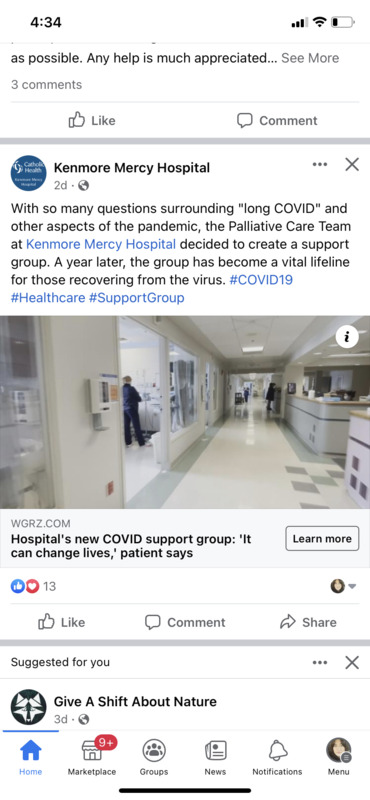 2022-02-22
2022-02-22COVID support groups
I did some heritage work for this hospital a couple years ago so I follow their social media. Apparently they’ve founded a COVID support group for people who have been profoundly impacted by COVID-related illness, death, and disability. I sometimes think that the chronic illness and disabling nature of long COVID is often overlooked. Who can blame anyone for overlooking it with all of the more obvious, loud, visible problems wrought by the pandemic? Anyhow this is something to think about. -
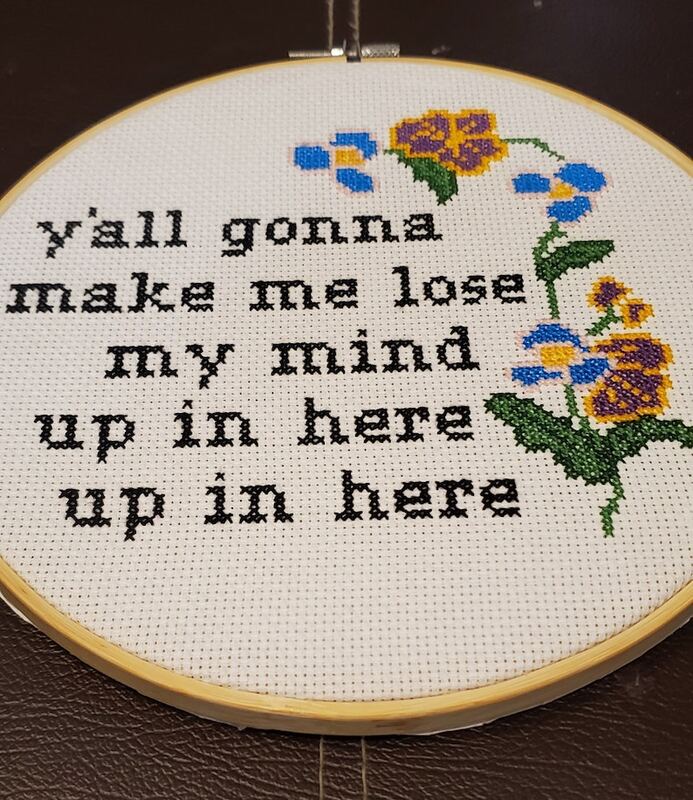 2020-04
2020-04Sounds of a Spring Lockdown
On March 25, 2020 Governor Polis ordered a state-wide stay at home order for Colorado. By this time, my family was already limiting our time outside the house to work or errands. My daughter, Kat, has severe asthma, so we knew we had to limit our exposure as much as possible. Previous midnight trips to the emergency room were full of her wheezing out tiny gulps of air, the beeps and blips of the machine keeping track of her heart rate, and the guttural growl of the blood pressure cuff as it tightened around her arm. These were the sounds I first heard when the stories of a new, novel virus came out, the sounds that stayed most in my mind the more I heard about rising cases. The first week in April the movie theater where Kat worked closed down. My son, Gabe, left his job a few days later. I cried that day, not from sadness but relief. And not a quick cry, but the loud sobs that make your shoulders shake. The next day was a major shift for us. Instead of leaving the house to work, they came to work for me instead. My cross stitch shop was already a full-time business. Now that many people were staying home, the US saw a return to basics (baking and crafting), and my shop exploded with more orders than I could fathom. There is something that satisfies most of us in having that tactile experience, whether it be the feel of flour (soft and powdery) as you knead your bread or the stabstab of your needle piercing your fabric. Though there was the stress of craft stores closing and supply chain delays, long work hours, and boxes of hoops stacked in the living room, there was mostly the sound of the Beatles and loads of laughter. Kat has a high-pitched giggle (she snorts when she really gets going), Gabe a deep laugh rich in tone. Someone came up with the adage that laughter is the best medicine. I couldn’t say who created the saying, but the sound of laughter in my house during the April 2020 lockdown in Colorado kept myself and my children in positive spirits. In fact, our lives have been forever changed by that April. They are back to their old jobs, but we still keep mostly at home and with each other. We have family game nights and cook together and keep the laughter going strong. -
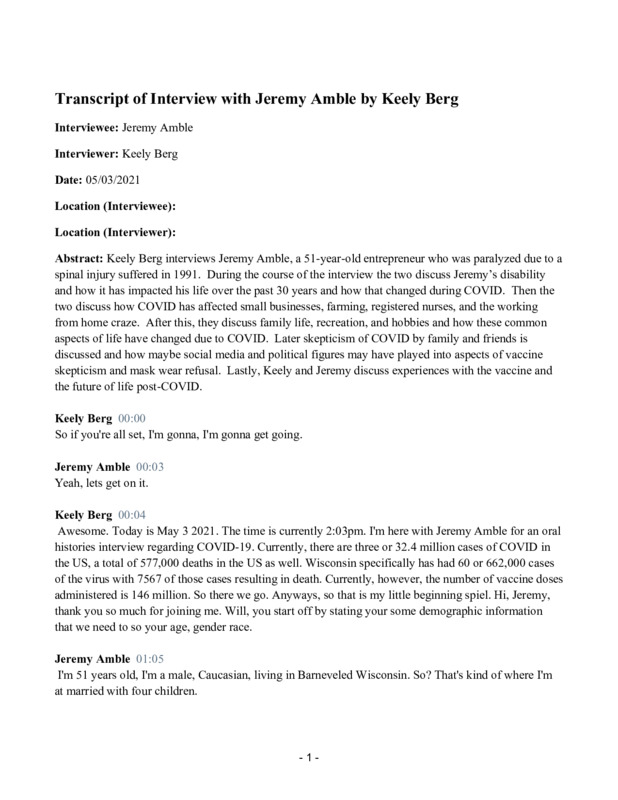 05/03/2021
05/03/2021Jeremy Amble Oral History, 2021/05/03
Keely Berg interviews Jeremy Amble, a 51-year-old entrepreneur who was paralyzed due to a spinal injury suffered in 1991. During the course of the interview the two discuss Jeremy’s disability and how it has impacted his life over the past 30 years and how that changed during COVID. Then the two discuss how COVID has affected small businesses, farming, registered nurses, and the working from home craze. After this, they discuss family life, recreation, and hobbies and how these common aspects of life have changed due to COVID. Later skepticism of COVID by family and friends is discussed and how maybe social media and political figures may have played into aspects of vaccine skepticism and mask wear refusal. Lastly, Keely and Jeremy discuss experiences with the vaccine and the future of life post-COVID. -
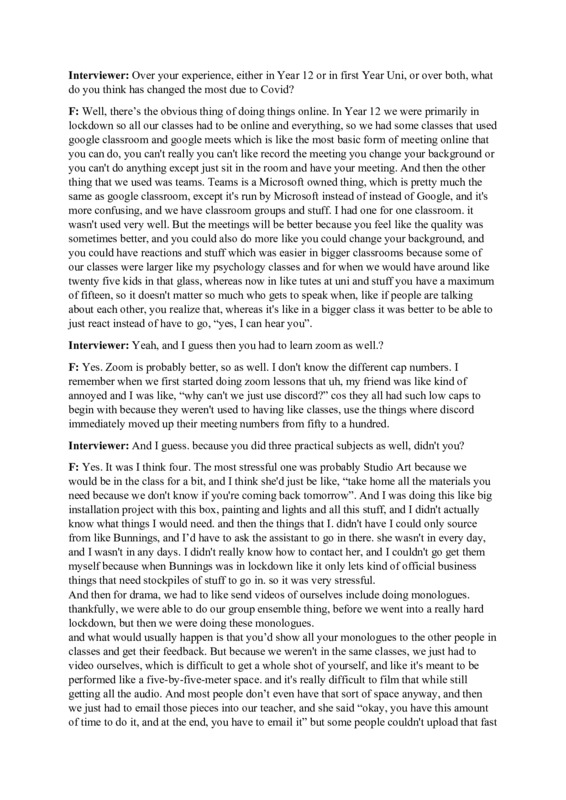 2021-10-15
2021-10-15HIST30060: From Year 12 to First-Year University
I interviewed my younger sibling, 'F', and transcribed the audio. They completed Year 12 in 2020 and then began university in 2021, which I believe is a significant transitionary time especially in the context of Covid to document. Their experiences in using different media forms for online classes is insightful and provides an interesting comparison. Additionally they provide insights into changing interests, socialising online, and reflecting on the world around them. They reflect on how they believe the nature of people has changed in relation to each other in an isolated but connected world, which I believe will be an interesting and informative insight for the future to gain an indepth understanding of the Covd-19 era from the perspective of the youth. -
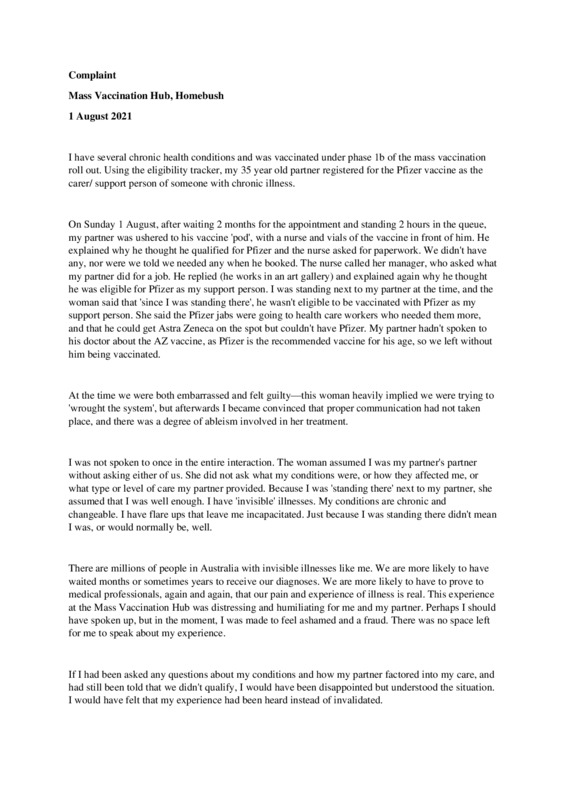 2021-08-01
2021-08-01Ableism and Vaccination
This is a complaint that I don't know whether to officially lodge about the treatment my partner and I experienced at the mass vaccination hub in Homebush. It is a complaint regarding ableism, and invisible illness. -
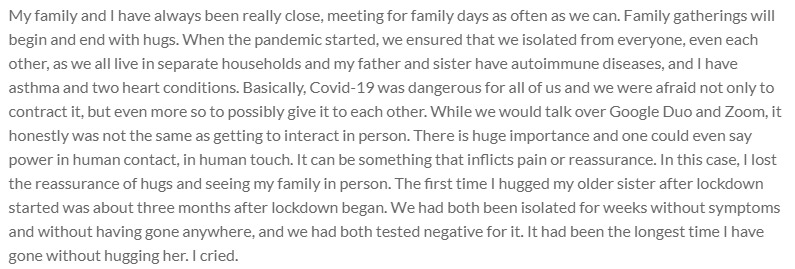 2020-05-25
2020-05-25First Hug in Months
My family and I have always been really close, meeting for family days as often as we can. Family gatherings will begin and end with hugs. When the pandemic started, we ensured that we isolated from everyone, even each other, as we all live in separate households and my father and sister have autoimmune diseases, and I have asthma and two heart conditions. Basically, Covid-19 was dangerous for all of us and we were afraid not only to contract it, but even more so to possibly give it to each other. While we would talk over Google Duo and Zoom, it honestly was not the same as getting to interact in person. There is huge importance and one could even say power in human contact, in human touch. It can be something that inflicts pain or reassurance. In this case, I lost the reassurance of hugs and seeing my family in person. The first time I hugged my older sister after lockdown started was about three months after lockdown began. We had both been isolated for weeks without symptoms and without having gone anywhere, and we had both tested negative for it. It had been the longest time I have gone without hugging her. I cried. -
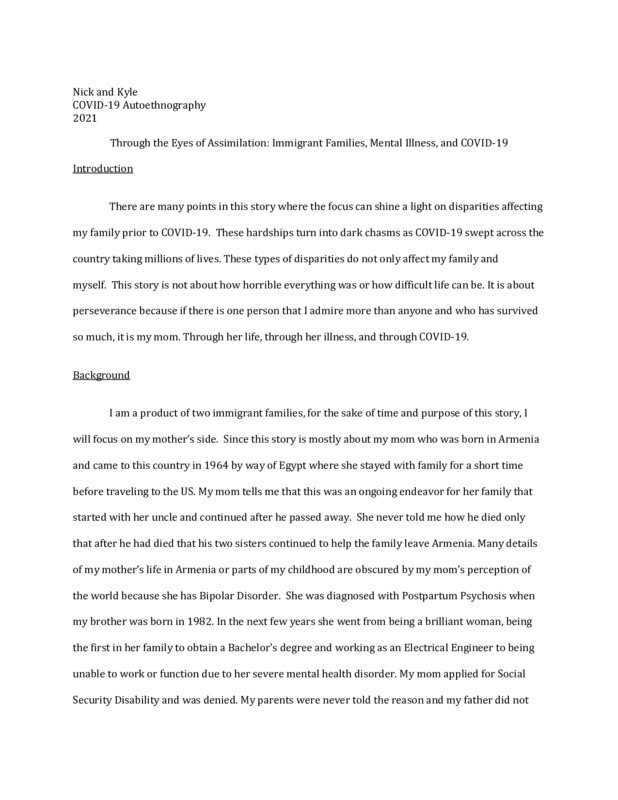 2020-05-09
2020-05-09Through the Eyes of Assimilation: Immigrant Families, Mental Illness, and COVID-19
This story is about my partner's family, utilizing both of our perspectives to talk about how his mother, and subsequently my partner, was treated due to mental illness, ethnicity, and gender identity. -
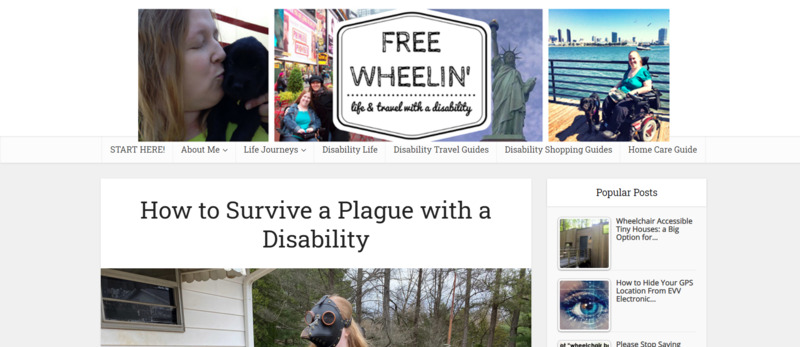 2021-03
2021-03How to Survive a Plague with a Disability
As I’m writing this, it is March 2021 and it’s been a year since I’ve updated this blog. Although I don’t only write about travel here, it’s been depressing to look back on my past trips and have to wonder when I could be in the world again. But I’ve been far from silent during this time. You can read many of my reflections on the pandemic and other topics over at The Mighty, where I have been an editor for the past five years. One year ago, when the pandemic was just beginning in the United States, one of my good friends posted a social media message about supporting each other during what most people thought would be a strange, scary, but ultimately short period of our lives. Part of it went something like this: My mask protects you. Your mask protects me. It’s a nice sentiment. Wearing a few layers of cloth over your face may not help you much, but it helps to prevent other people from getting sick. It’s a kind, visible act we can all do to show we care during a difficult time, to protect others who are at risk even if we may think we would not become seriously ill. It seems so simple, right? How could people not do this? But we all know what happened. “My mask protects you. Your mask protects me,” only works if the other person values your life enough to consider it worth protecting. I’ve been horrified by the number of government officials and online commenters who have viewed the deaths of elderly and disabled people as “acceptable losses” in exchange for keeping non-essential gathering spaces open. My life, and the lives of people with high-risk conditions, are more important than your trip to Disneyland. Don’t you think we want to go to Disneyland too? I’ve also noticed that able-bodied people often assume disabled people will be provided for in emergencies, and in general. They believe there are a lot of government programs and charities to help us, and that such programs are run well and meet our needs. This widespread — but utterly false — belief in a functioning safety net for “the vulnerable” gives people an excuse to behave selfishly while convincing themselves they’re not doing anything wrong. “Of course, there will be a plan to protect nursing home residents, and immune-suppressed people can stay home, so we can throw parties and go without masks if we don’t like them.” In reality, the needs of people with disabilities are often disregarded, misunderstood, ignored, and even actively opposed. We have to fight for access to everything, and sometimes end up on multi-year waiting lists for housing assistance, in-home care, and other essential programs and services. We must battle with government and private insurance to get the mobility equipment we need. We are GPS tracked like criminals if we need personal care assistants, with “fraud prevention” used as an excuse. We often depend on programs with ridiculously complicated requirements, and one missed deadline, one paperwork error, one month where we made “too much money” can cost us everything. -
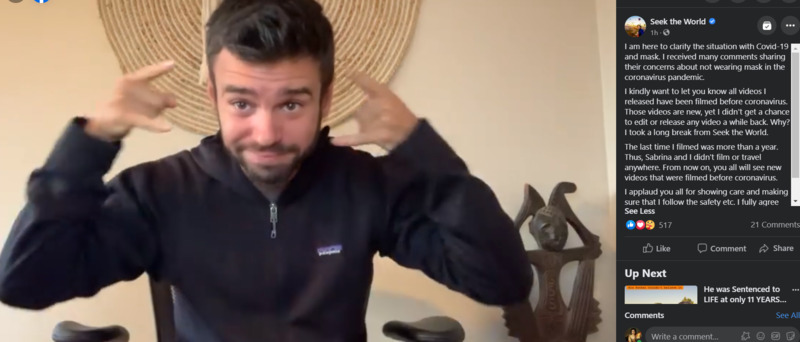 2021-04-22
2021-04-22Seek the World talks about why their videos showed them without a mask
I am here to clarify the situation with Covid-19 and mask. I received many comments sharing their concerns about not wearing mask in the coronavirus pandemic. I kindly want to let you know all videos I released have been filmed before coronavirus. Those videos are new, yet I didn't get a chance to edit or release any video a while back. Why? I took a long break from Seek the World. The last time I filmed was more than a year. Thus, Sabrina and I didn't film or travel anywhere. From now on, you all will see new videos that were filmed before coronavirus. I applaud you all for showing care and making sure that I follow the safety etc. I fully agree with you all everyone needs to wear mask! Thanks! -
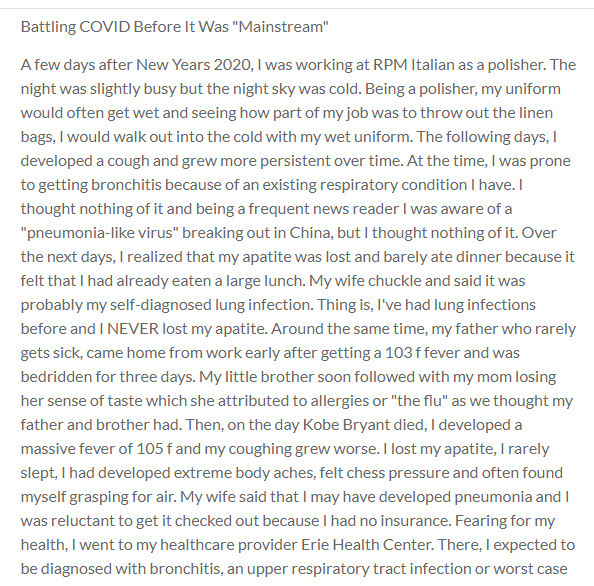 2020-01-04
2020-01-04Battling COVID Before It Was "Mainstream"
A few days after New Years 2020, I was working at RPM Italian as a polisher. The night was slightly busy but the night sky was cold. Being a polisher, my uniform would often get wet and seeing how part of my job was to throw out the linen bags, I would walk out into the cold with my wet uniform. The following days, I developed a cough and grew more persistent over time. At the time, I was prone to getting bronchitis because of an existing respiratory condition I have. I thought nothing of it and being a frequent news reader I was aware of a "pneumonia-like virus" breaking out in China, but I thought nothing of it. Over the next days, I realized that my apatite was lost and barely ate dinner because it felt that I had already eaten a large lunch. My wife chuckle and said it was probably my self-diagnosed lung infection. Thing is, I've had lung infections before and I NEVER lost my apatite. Around the same time, my father who rarely gets sick, came home from work early after getting a 103 f fever and was bedridden for three days. My little brother soon followed with my mom losing her sense of taste which she attributed to allergies or "the flu" as we thought my father and brother had. Then, on the day Kobe Bryant died, I developed a massive fever of 105 f and my coughing grew worse. I lost my apatite, I rarely slept, I had developed extreme body aches, felt chess pressure and often found myself grasping for air. My wife said that I may have developed pneumonia and I was reluctant to get it checked out because I had no insurance. Fearing for my health, I went to my healthcare provider Erie Health Center. There, I expected to be diagnosed with bronchitis, an upper respiratory tract infection or worst case scenario pneumonia. However, when the doctor saw my condition and heard my symptoms he said that it wasn't: pneumonia, bronchitis or a lung infection. Baffled I said then what do I have and he responded with: "mhmmmmm do you have asthma?" I said I did when I was younger but I out grew it. His response: "That's it. It's asthma". Unsatisfied, I said its not it because I haven't had any asthma complications in over a decade. He later said that a lung operation I had when I was three days old might be the culprit. Once again, I questioned it. He conceded and asked if I wanted to get x-rays done. I agreed and went to Northwestern Medical Center with Erie covering the costs. I got my x-rays done and I decided to go have lunch with my wife. Then, I started coughing, lost my apatite and developed a fever. We took an uber and went home were I collapsed on my bed and was knocked out cold in a nice sleep for 20 hours. The cough never went away until late February when talks of a potential lockdown to contain COVID was being discussed. I never thought much of what I had that winter until my mom got an anti-body test where she came out positive for the anti-bodies. The same day we watched a COVID special on Netflix and they highlighted the COVID symptoms. The ones that stuck out to me was: loss of apatite, chest pressure, fatigue, coughing, short-breaths, fever and trouble focusing. I clicked everything and realized: "Holy shit. I must've had COVID before it was cool" (ironically). Ever since my illness as I described, my mind has become more "foggy" with me having trouble focusing, remembering and even stuttering more often. Trouble focusing has been mentioned as a COVID complication in your post-battle with the infection. Fast forward to February 2021, I went back to Erie to get my yearly physical done expecting to hear my sugar levels were off the charts. Except, my doctor walked in and first thing he said was: "so you had problems breathing in last year January?" I gave him a stare and asked "you don't think that I had..." and he interrupted and said "sir, you either had COVID before we knew what it was or you had some exotic virus" mentioning the latter in a sarcastic tone. There I realized, how chill I took COVID and literally brushed it off multiple times as a lung infection and nothing serious when in reality it was. Had I known what I had was COVID at the time that I had it, I would have been panicking and picturing death at my door. Often, your mindset can be just as dangerous as the illness itself. -
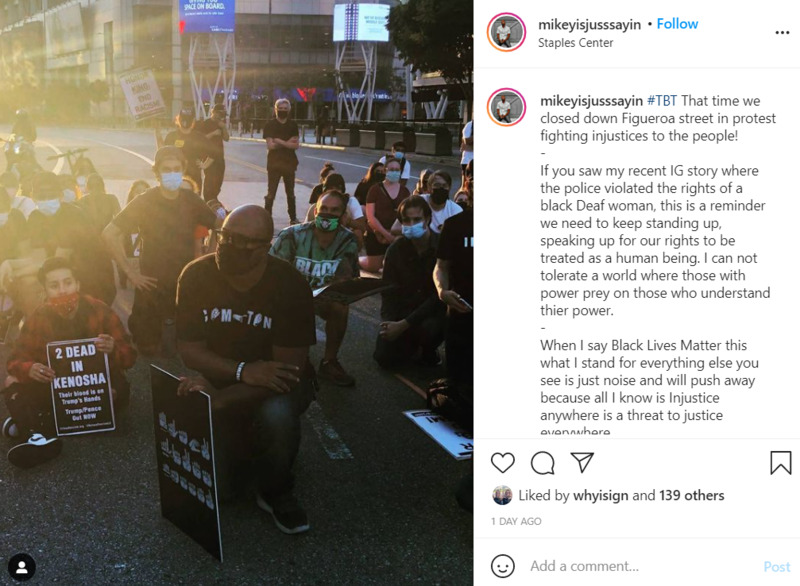 2021-04-09
2021-04-09That time we closed down Figueroa street in protest fighting injustices to the people!
#TBT That time we closed down Figueroa street in protest fighting injustices to the people! - If you saw my recent IG story where the police violated the rights of a black Deaf woman, this is a reminder we need to keep standing up, speaking up for our rights to be treated as a human being. I can not tolerate a world where those with power prey on those who understand thier power. - When I say Black Lives Matter this what I stand for everything else you see is just noise and will push away because all I know is Injustice anywhere is a threat to justice everywhere. - Stand with Me. Let's do our part to shape a better world. Power to the People all the time.✊🏿 - 📷 Gratitude @aanaconda -
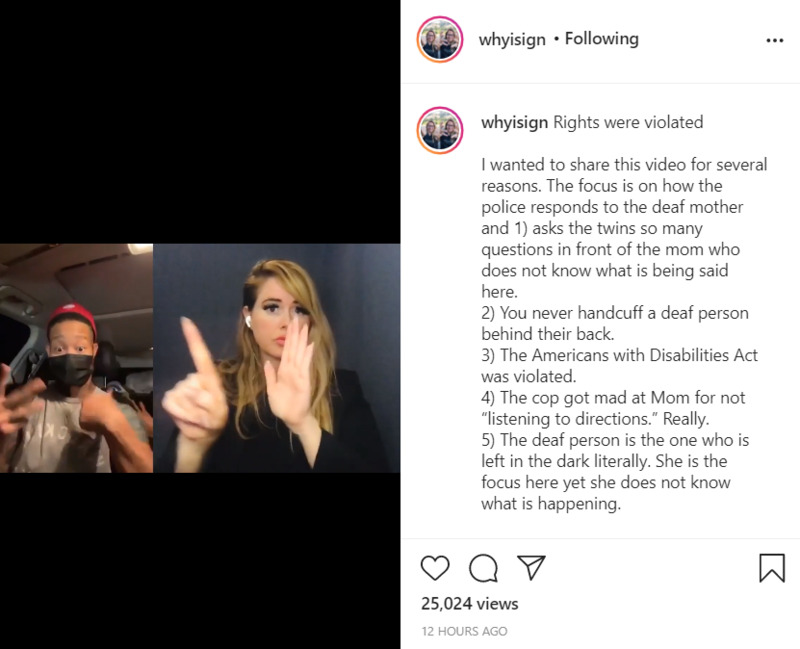 2021-04-09
2021-04-09Rights were violated
Rights were violated I wanted to share this video for several reasons. The focus is on how the police responds to the deaf mother and 1) asks the twins so many questions in front of the mom who does not know what is being said here. 2) You never handcuff a deaf person behind their back. 3) The Americans with Disabilities Act was violated. 4) The cop got mad at Mom for not “listening to directions.” Really. 5) The deaf person is the one who is left in the dark literally. She is the focus here yet she does not know what is happening. Unfortunately, this is too common in deaf and hard of hearing people’s experience with the police. This should not be the common experience in dealing with the police. There are more reasons, but the point is… this is one reason why the deaf people are so hesitant about getting help/support from the police. I hope this video as traumatizing, becomes a lesson. Police reform is much needed in so many areas, including learning how to communicate & how to work with deaf and hard of hearing people, the DO’s and the DON’Ts as seen here. I hope to see more training with the police departments in understanding how to work with deaf and hard of hearing people. I pray for healing for Mom- @burgundre Drizzy, and her twins. You can go and support her as she fights this. Trigger warning here. Posted @withregram • @kelly4access 11 year old twin girls are forced by police (Michael Rose of the North Las Vegas PD) to interpret for their deaf mom and are interrogated while she is handcuffed. @burgundre recorded recorded her encounter on FB Live. Thanks so much @dpantv for working late in the night to make this accessible!! #asl #captions #signlanguage #police #discrimination #injustice #ada #policebrutality #whyisign #askmewhyisign -
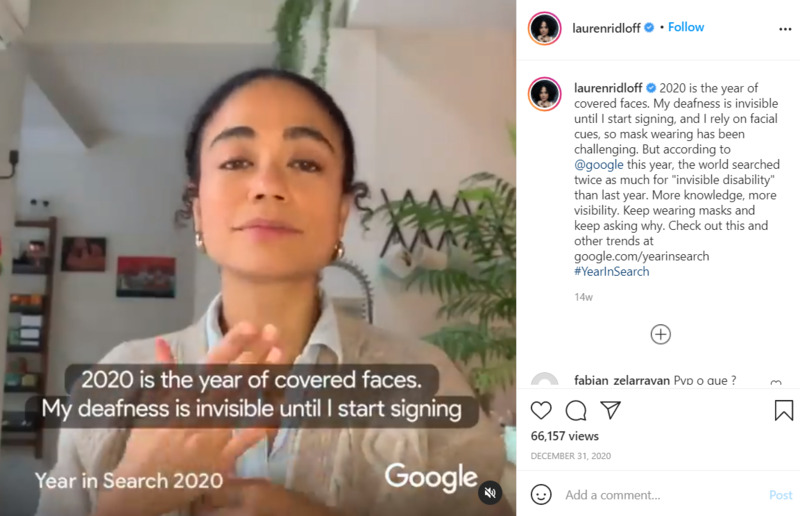 2020-12-31
2020-12-312020 is the year of covered faces
2020 is the year of covered faces. My deafness is invisible until I start signing, and I rely on facial cues, so mask wearing has been challenging. But according to @google this year, the world searched twice as much for "invisible disability" than last year. More knowledge, more visibility. Keep wearing masks and keep asking why. Check out this and other trends at google.com/yearinsearch #YearInSearch -
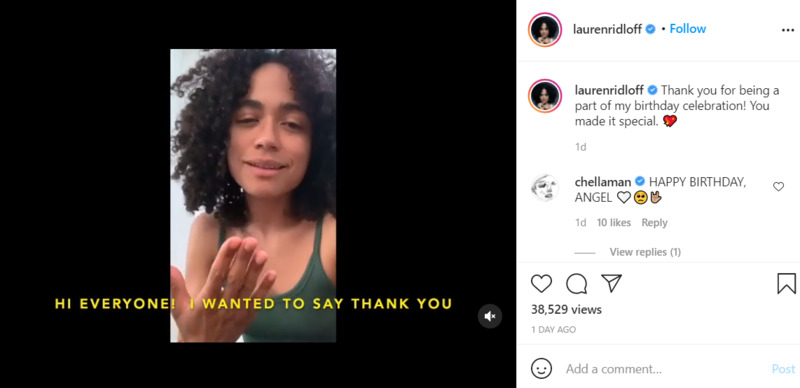 2021-04-09
2021-04-09Lauren Ridloff birthday message
Lauren Ridloff thanks their followers for making their second birthday in a pandemic a special one and encourages everyone to keep fighting. -
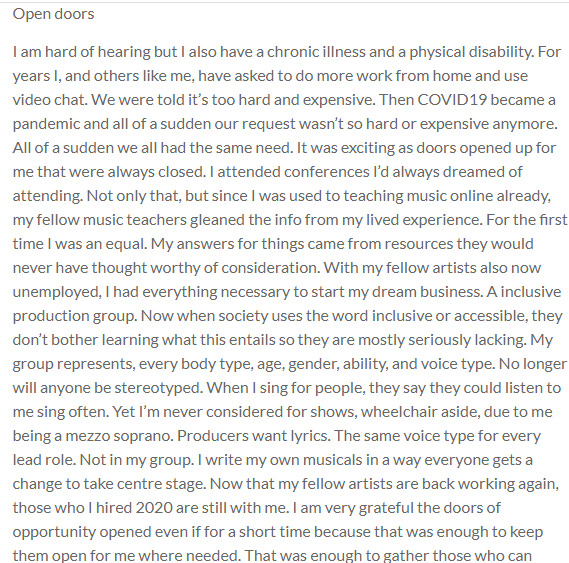 2021-04-06
2021-04-06Open doors
I am hard of hearing but I also have a chronic illness and a physical disability. For years I, and others like me, have asked to do more work from home and use video chat. We were told it’s too hard and expensive. Then COVID19 became a pandemic and all of a sudden our request wasn’t so hard or expensive anymore. All of a sudden we all had the same need. It was exciting as doors opened up for me that were always closed. I attended conferences I’d always dreamed of attending. Not only that, but since I was used to teaching music online already, my fellow music teachers gleaned the info from my lived experience. For the first time I was an equal. My answers for things came from resources they would never have thought worthy of consideration. With my fellow artists also now unemployed, I had everything necessary to start my dream business. A inclusive production group. Now when society uses the word inclusive or accessible, they don’t bother learning what this entails so they are mostly seriously lacking. My group represents, every body type, age, gender, ability, and voice type. No longer will anyone be stereotyped. When I sing for people, they say they could listen to me sing often. Yet I’m never considered for shows, wheelchair aside, due to me being a mezzo soprano. Producers want lyrics. The same voice type for every lead role. Not in my group. I write my own musicals in a way everyone gets a change to take centre stage. Now that my fellow artists are back working again, those who I hired 2020 are still with me. I am very grateful the doors of opportunity opened even if for a short time because that was enough to keep them open for me where needed. That was enough to gather those who can make and keep this dream a reality. We are set to debut our first show in June 2021. It doesn’t get better than that. So while COVID itself is horrendous, the lifestyle the pandemic made universal helped others see what we live daily, and it also created a more universal work place for all. -
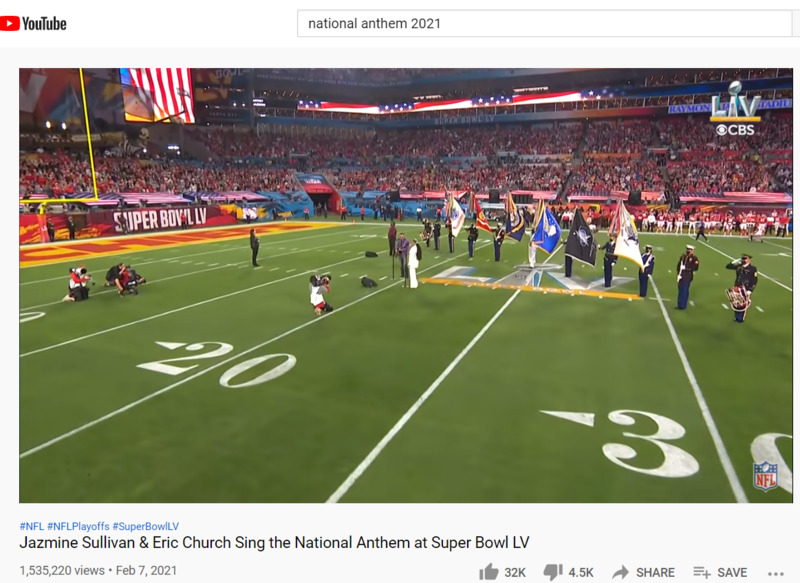 2021-02-07
2021-02-07Jazmine Sullivan & Eric Church Sing the National Anthem at Super Bowl LV, Interpreted by "Wawa" in ASL
Jazmine Sullivan and Eric Church sing the National Anthem for the Super Bowl LV Pregame Show. Warren “Wawa” Snipe performed the song in ASL. The Kansas City Chiefs take on the Tampa Bay Buccaneers during Super Bowl LV in Tampa Bay. -
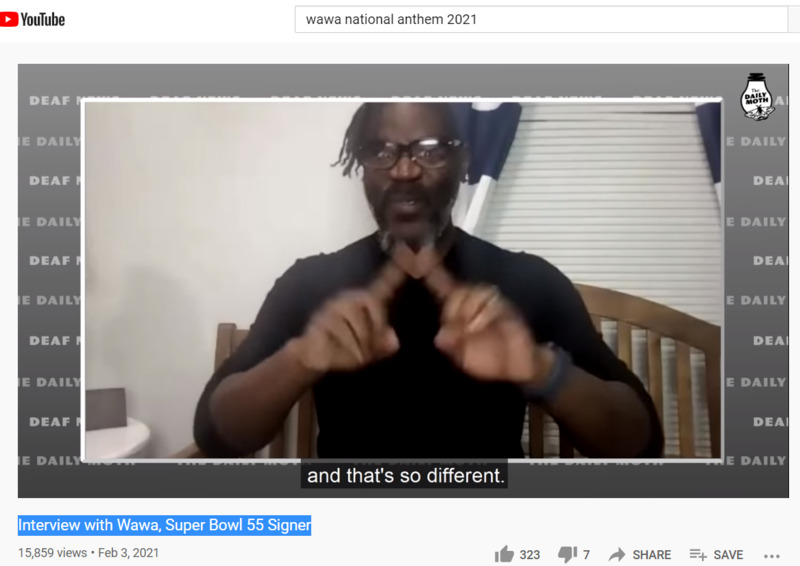 2021-02-03
2021-02-03Interview with Wawa, Super Bowl 55 Signer
Interview with Warren "Wawa" Snipe about his gig with Super Bowl 55 this Sunday. We also discuss his new album, “Wamilton,” and his genre of Dip Hop. -
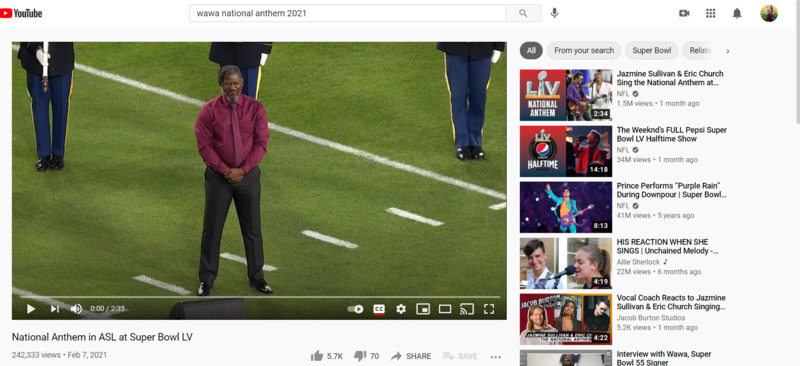 2021-02-07
2021-02-07National Anthem in ASL at the Superbowl
What a performance! Warren "Wawa" Snipe performed two songs during the Super Bowl. The National Anthem and America the Beautiful. He really stole the show! Kissfist! Muah! The performers were socially distanced. I wanted to add this to the archive so everyone can see Wawa's performance. He interpreted for artist H.E.R. Do you see the end? He knew he nailed it. Representation and inclusivity matter. -
 2021-02-07
2021-02-07ASL performer steals the show during Super Bowl national anthem
Warren “Wawa” Snipe, who is deaf, performed the song in American Sign Language, and won over fans in the process. He also performed during H.E.R.'s rendition of "America the Beautiful." -
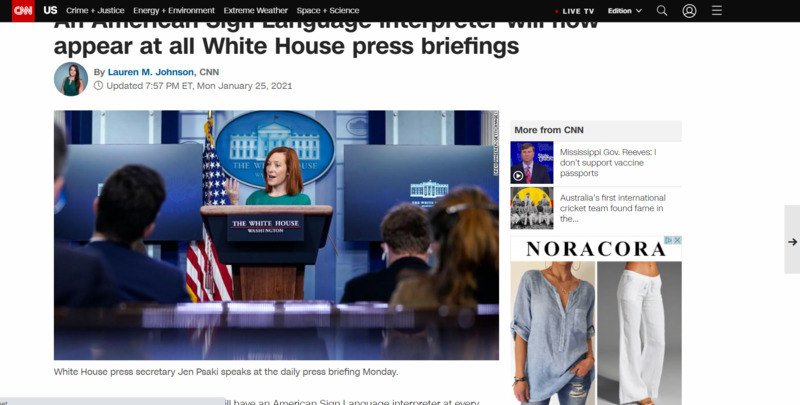 2021-01-25
2021-01-25An American Sign Language interpreter will now appear at all White House press briefings
The Biden administration will have an American Sign Language interpreter at every White House briefing, press secretary Jen Psaki said Monday. "As a part of this administration's accessibility and inclusion efforts, starting today we will have an ASL, an American Sign Language interpreter for our daily press briefings," Psaki said at Monday's briefing. "The President is committed to building an America that is more inclusive, more just and more accessible for every American, including Americans with disabilities and their families." The first interpreter was identified only as Heather and appeared virtually at the bottom of the screen while Psaki gave her remarks. The administration was praised for having the Pledge of Allegiance signed simultaneously with its recitation at the inauguration last Wednesday. The move set a different tone from the previous administration, which was sued in August by the National Association of the Deaf and five deaf Americans for not providing ASL interpreters at Covid-19 briefings. A federal judge ordered the Trump administration in September to provide ASL interpreters at the briefings beginning October 1, whether in person or via video. -
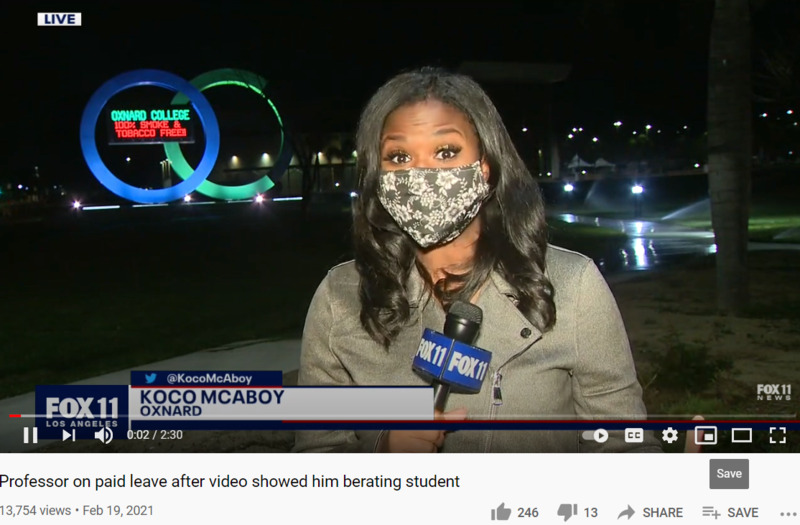 2021-02-19
2021-02-19Professor Abusive Toward HoH Student in Online Class
A professor is being placed on paid administrative leave after a viral video showed the instructor berating a student in front of the Zoom class. -
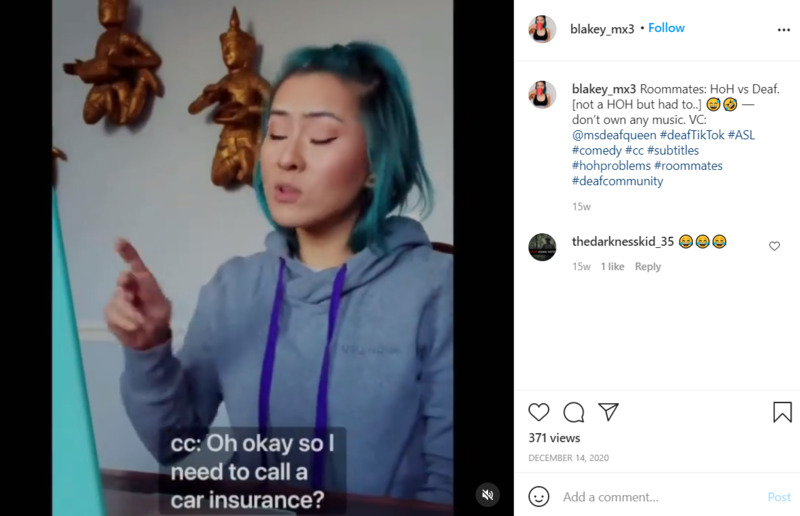 2020-12-14
2020-12-14Frustrations of Virtual Meetings Skit in ASL
blakey_mx3 highlights the frustration of virtual meetings during lockdown in a comical skit. -
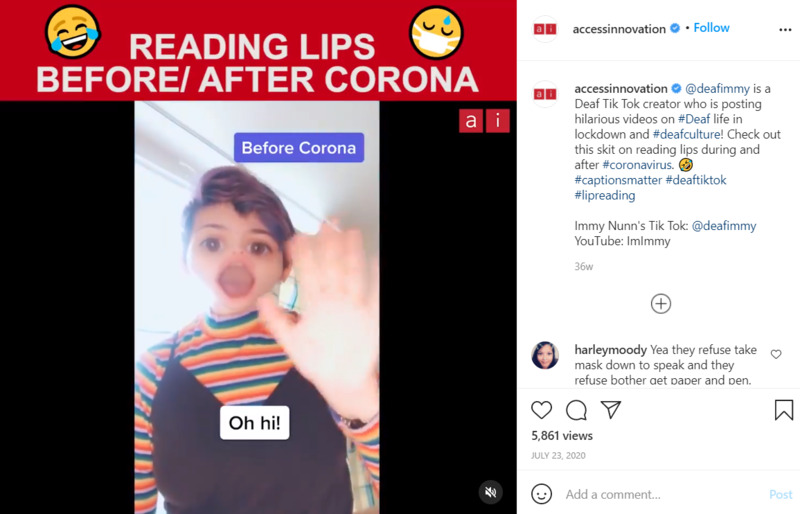 2020-07-23
2020-07-23I'm F*%!@d!
@deafimmy is a Deaf Tik Tok creator who is posting hilarious videos on #Deaf life in lockdown and #deafculture! Check out this skit on reading lips during and after #coronavirus. 🤣 #captionsmatter #deaftiktok #lipreading Immy Nunn's Tik Tok: @deafimmy YouTube: ImImmy -
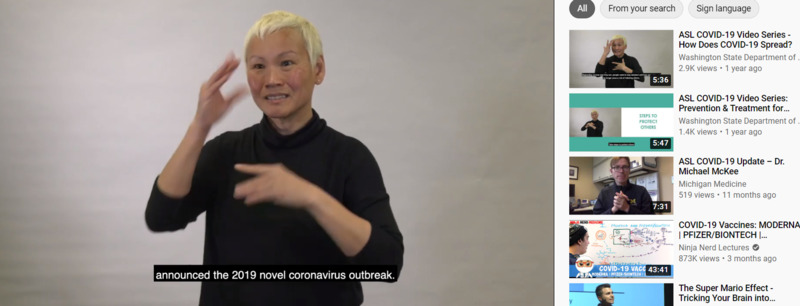 2020-03-22
2020-03-22ASL Covid-19 Video Series
The Washington State Department of Health releases a ASL Covid-19 Series. -
 2020-04-19
2020-04-19New Vocabulary Related to the Covid-19 Pandemic in ASL
A lot of us were exposed to new vocabulary at the onset of the Covid-19 pandemic. This video was helpful to me when everything first started. From ASL Meredith: Full COVID-19 PLAYLIST: https://www.youtube.com/playlist?list... This video teaches the American Sign Language (ASL) signs for related to the COVID-19 pandemic. Signs and timestamps below... 0:39 CORONAVIRUS 1:28 VIRUS intro (short), again slower at 3:47 after the parts that make it up: 1:43 SICK 2:25 DISEASE 2:49 SPREAD 3:47 VIRUS 4:31 PANDEMIC 5:15 WORLD 5:35 SLOW 6:01 "Flatten the curve" 6:27 STAY 6:49 HOME Learn how to sign SOCIAL DISTANCING or PHYSICAL DISTANCING: https://youtu.be/z974LyRWeEQ LEARN SIGN LANGUAGE REMOTELY: Here's the page with my tips and resources for learning ASL from home: https://aslmeredith.com/learn-from-home Here's my free email newsletter with learning tips and practice exercises: https://aslmeredith.com/newsletter Here's my online, self-paced ASL vocab + grammar beginner course: https://courses.aslmeredith.com/ -
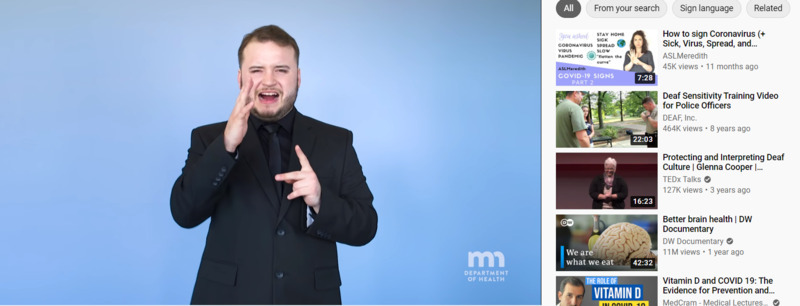 2020-03-11
2020-03-11Minnesota Department of Health Travel, and Covid-19 Information in ASL
This video covers the basic information of the 2020 novel coronavirus (COVID-19) outbreak. For more information on COVID-19 visit: https://www.health.state.mn.us/diseas... ASL talent - James Paul Beldon III, Keystone Interpreting Solutions Video Transcript - Hello. This is a message from the Minnesota Department of Health. Lately we’re hearing a lot about an outbreak associated with novel coronavirus. This outbreak started in China, and now has spread to other countries including the United States. The novel coronavirus causes respiratory illness in people and can spread from person to person. Symptoms of infection include fever, cough, and shortness of breath. While most people recover, it has led to serious illnesses and death in some cases. Minnesota’s public health community is working hard to protect you, and we’re asking for your help by following the same precautions we all use to prevent colds and flu: ▪ Wash your hands often and well with soap and water. ▪ Cover your cough every time. ▪ Stay home when you are sick. Also, if you’ve recently traveled where novel coronavirus is spreading and have symptoms, be sure to call your doctor or health care provider to let them know of your symptoms and your travel history. They will work with you to assess your condition and take appropriate steps to get any needed treatment while limiting the risk of passing along an infection to others. We are learning more about this outbreak and will share key information as it continues. You can stay up to date by visiting the Minnesota Department of Health’s website at health.state.mn.us. -
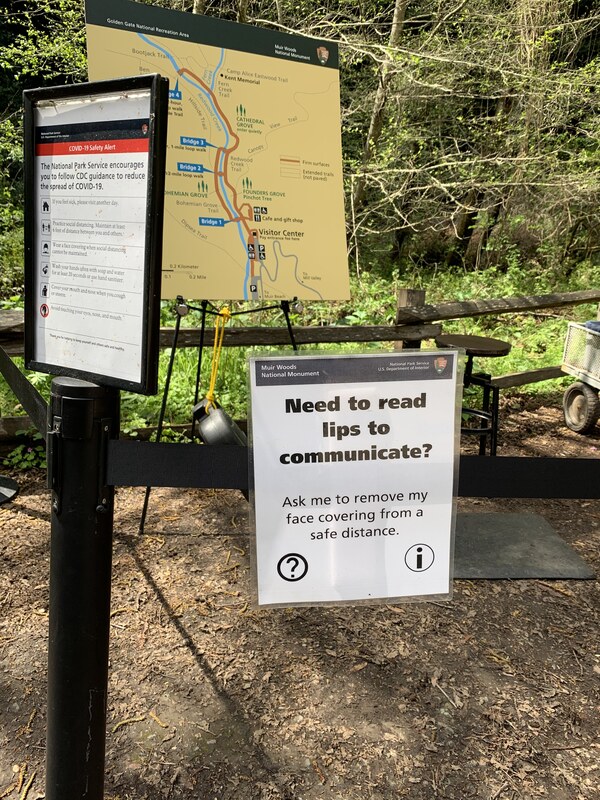 2021-03-20
2021-03-20If You Need To Read Lip's...
At Muir Woods National Park the park ranger had a sign displayed, If you need to read lips just let them know and they will remove their face coverings to communicate with you. I was super impressed. This year has be rough. I make my husband do the shopping after a man yelled at me at the beginning of the pandemic because I didn't hear the cashier the next isle over when she said she could help me. The man yelled, "What are you deaf?" and I was too embarrassed to defend myself. I don't wear my hearing aids now because of the mask. Insurance wont cover the cost of the hearing aid and it costs more than my car. I am worried a hearing aid will fly off when I remove my mask so against the advisement of my audiologist I just keep them off. It's whatever. Seeing signs like this just impress me. Inclusivity matters. -
 2021-01-20
2021-01-20Inclusivity at the Inauguration
Georgia Fire Captain Andrea M. Hall recited the Pledge of Allegiance at the inauguration of President-elect Joe Biden on Wednesday morning. She also signed in American Sign Language as she spoke. -
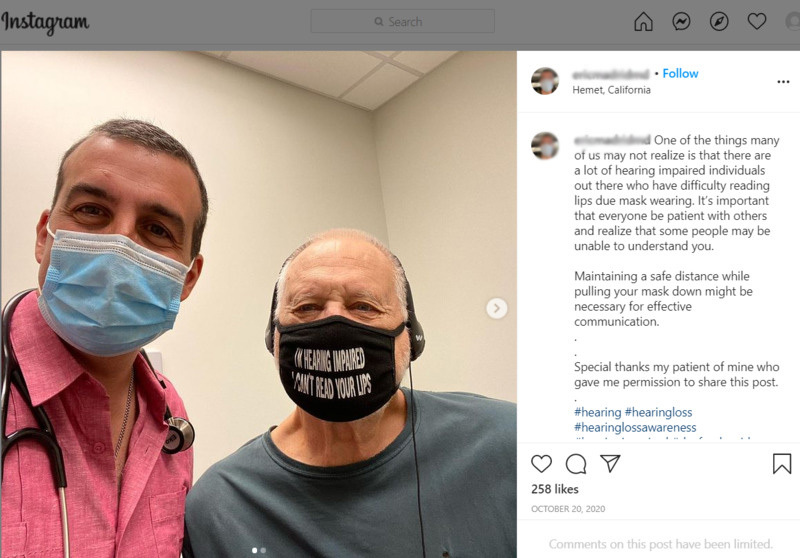 2020-10-20
2020-10-20Communication
One of the things many of us may not realize is that there are a lot of hearing impaired individuals out there who have difficulty reading lips due mask wearing. It’s important that everyone be patient with others and realize that some people may be unable to understand you. Maintaining a safe distance while pulling your mask down might be necessary for effective communication. . . Special thanks my patient of mine who gave me permission to share this post. . #hearing #hearingloss #hearinglossawareness #hearingimpaired #deafandcovid #deafandmasks #covid_19 -
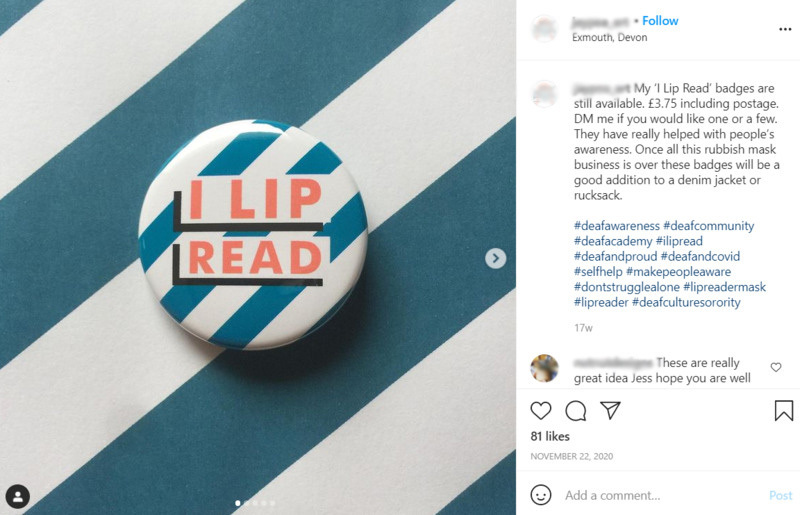 2020-11-22
2020-11-22I Lip Read Badge
My ‘I Lip Read’ badges are still available. £3.75 including postage. DM me if you would like one or a few. They have really helped with people’s awareness. Once all this rubbish mask business is over these badges will be a good addition to a denim jacket or rucksack. #deafawareness #deafcommunity #deafacademy #ilipread #deafandproud #deafandcovid #selfhelp #makepeopleaware #dontstrugglealone #lipreadermask #lipreader #deafculturesorority -
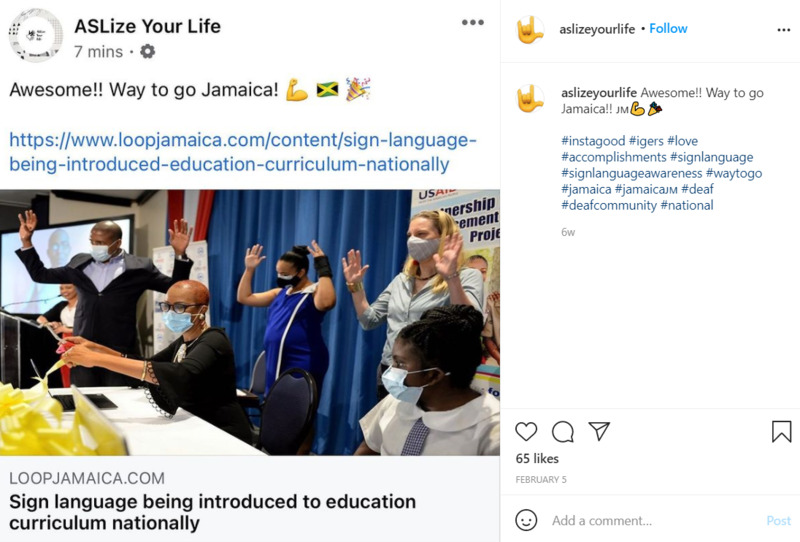 2021-02-05
2021-02-05Jamaica Introduces Sign Language In Education Curriculum
Awesome!! Way to go Jamaica!! 🇯🇲💪🎉 #instagood #igers #love #accomplishments #signlanguage #signlanguageawareness #waytogo #jamaica #jamaica🇯🇲 #deaf #deafcommunity #national -
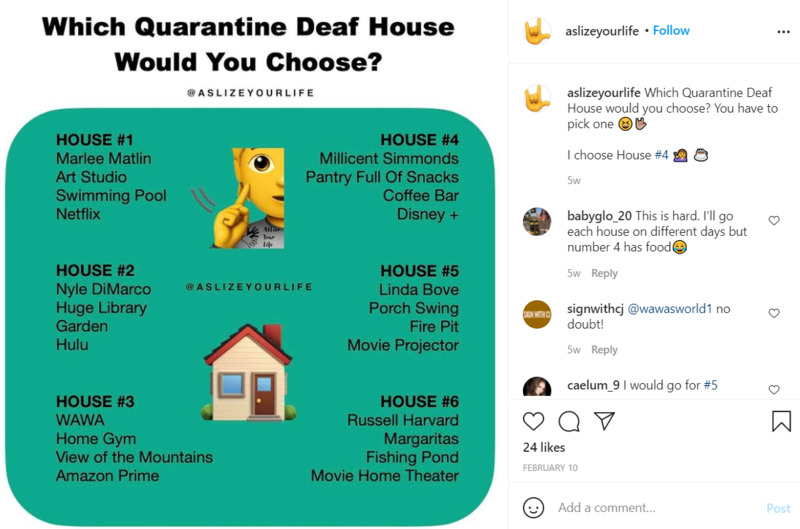 2021-02-10
2021-02-10Which Quarantine Deaf House Would You Choose?
Which Quarantine Deaf House would you choose? You have to pick one 😆🤟🏼 I choose House #4 🧏♀️ ☕️ -
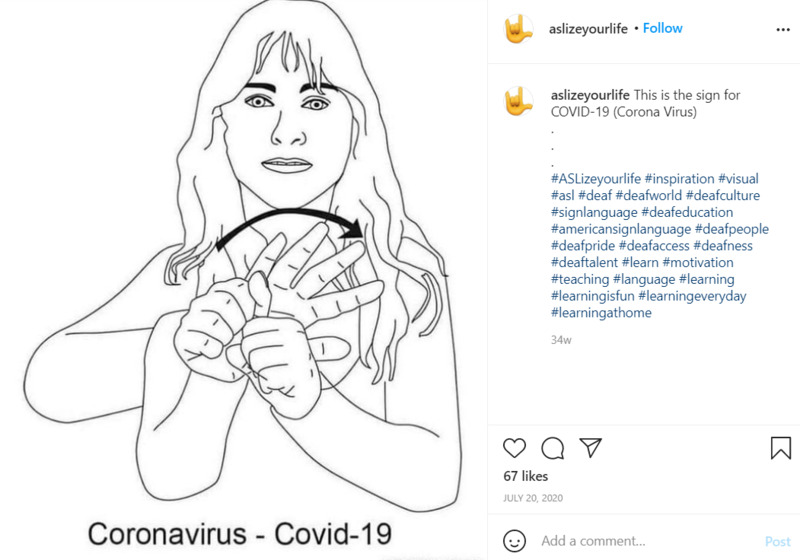 2020-07-20
2020-07-20Sign for Covid-19 in ASL
This is the sign for COVID-19 (Corona Virus) . . . #ASLizeyourlife #inspiration #visual #asl #deaf #deafworld #deafculture #signlanguage #deafeducation #americansignlanguage #deafpeople #deafpride #deafaccess #deafness #deaftalent #learn #motivation #teaching #language #learning #learningisfun #learningeveryday #learningathome
